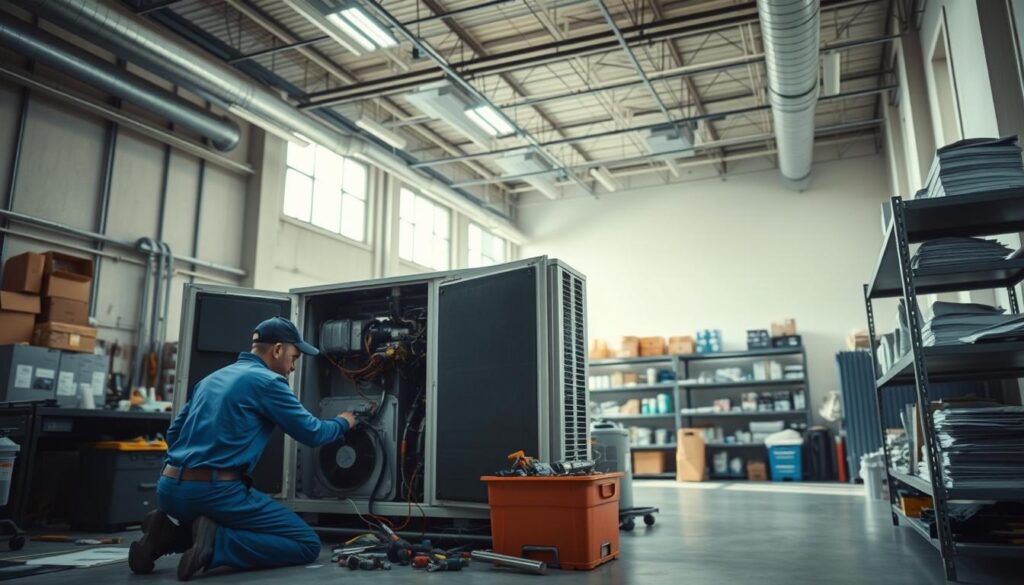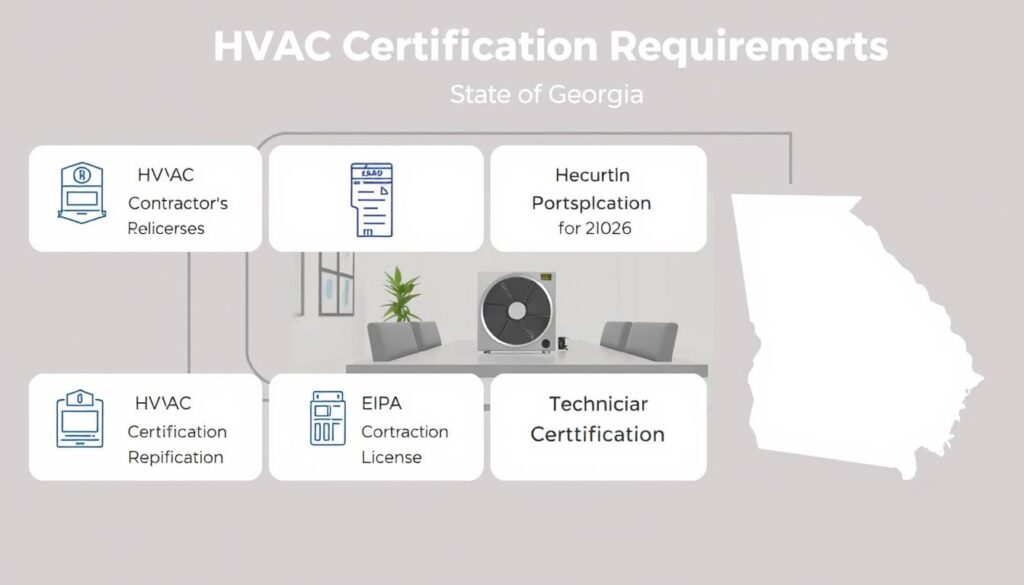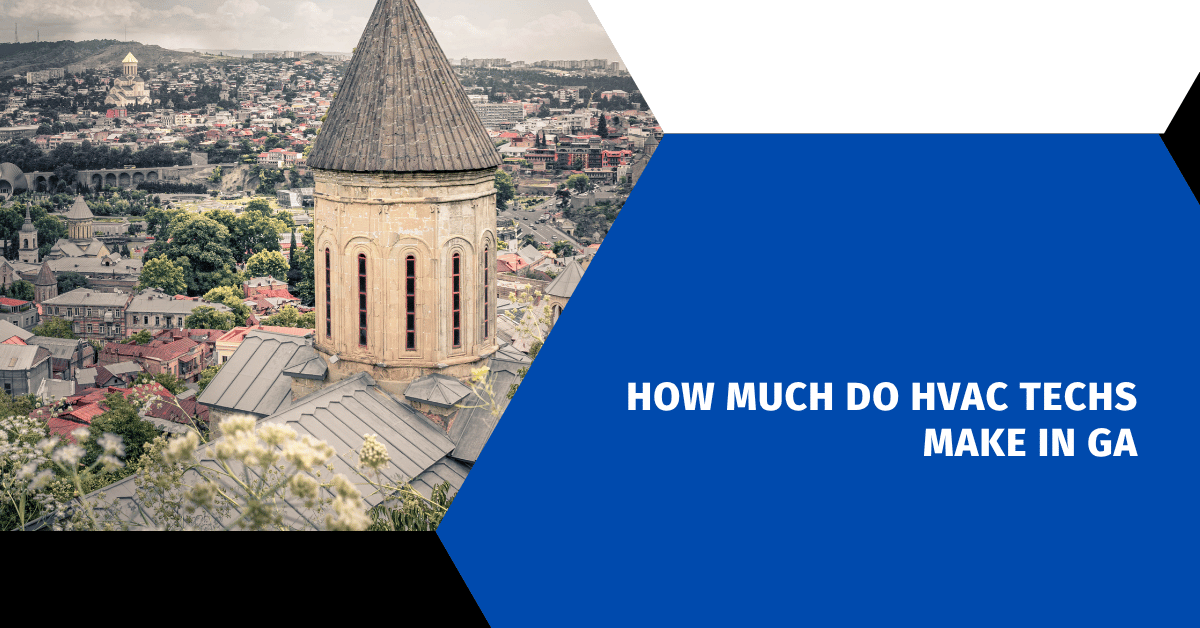Affiliate Disclosure
HVAC Guide Guys is a participant in the Amazon Services LLC Associates Program, an affiliate advertising program designed to provide a means for sites to earn advertising fees by advertising and linking to Amazon.
How Much Do HVAC Techs Make In GA? Ever wondered what you could earn as an HVAC technician in Georgia? Are you curious about the financial side of this important job? It keeps homes and businesses comfy all year.

The HVAC technician salary in Georgia is a great chance for skilled workers. Recent data shows HVAC techs in the state earn about $47,270 a year. This makes it a stable and promising career for those in technical trades.
Knowing how much HVAC techs make in GA can help you plan your career. The HVAC industry offers many chances to grow and earn well, from entry-level to advanced roles.
Key Takeaways
- Average HVAC technician salary in Georgia is approximately $47,270 annually
- Multiple factors influence HVAC tech earnings
- Career opportunities vary across different regions of Georgia
- Specialized skills can significantly increase income
- HVAC remains a stable and growing profession in the state
Table of Contents
Current HVAC Technician Salary Trends in Georgia
Understanding the salary landscape for HVAC technicians in Georgia is key. It helps you plan your career and set income goals. The average pay for HVAC technicians in Georgia varies a lot. It depends on experience, skills, and specialization.
Let’s look at salary trends at different career stages. This will give you a clear view of what you can earn in this field.
Entry-Level Salaries in Georgia
Starting out in HVAC, your first salary might seem low. New technicians can make between $29,160 and $35,000 a year. Several factors affect these starting wages:
- Educational background
- Apprenticeship completion
- Basic certification levels
- Geographic location within Georgia
Mid-Career Earnings
As you gain more experience and skills, your pay goes up. Mid-career HVAC technicians in Georgia make between $45,000 and $60,000 a year. This increase comes from:
- More technical skills
- Advanced certifications
- Knowledge in complex HVAC systems
- Success in installations
Senior-Level HVAC Compensation
Experienced HVAC pros can earn a lot. Senior technicians in Georgia can make up to $75,940 a year. These high salaries come from:
- Leadership roles
- Project management
- Specialized commercial or industrial HVAC work
- Advanced technical consulting
“Your career growth in HVAC directly correlates with your commitment to continuous learning and skill development.” – Georgia HVAC Industry Expert
Explore Our HVAC Shop
Looking for top-rated HVAC tools, parts, and accessories? Visit our shop and find the perfect solution for your needs.
Visit the ShopHow Much Do HVAC Techs Make in GA: Breaking Down the Numbers
Exploring an HVAC career in Georgia means understanding the salary landscape. It’s key for both current and future technicians. The state’s wage structure is promising, with high pay in cities like Atlanta.
HVAC wages in Atlanta and Georgia are competitive. Technicians earn an average of $27 per hour, or about $54,400 a year. Your actual pay depends on several things:
- Experience level
- Specialization within HVAC
- Geographic location
- Employer type
The salary breakdown shows interesting details for HVAC pros. Newbies start at around $40,000 a year. Experienced ones can make up to $75,000. Skills in commercial HVAC or advanced certifications can increase your earnings.
Several factors affect your HVAC career in Georgia:
- Certification levels
- Technical expertise
- Workplace demand
- Additional specialized training
Urban areas like Atlanta pay more than rural ones. Your ability to adapt, learn, and gain specialized skills will affect your income. This field is dynamic and rewarding.
Explore Our HVAC Shop
Looking for top-rated HVAC tools, parts, and accessories? Visit our shop and find the perfect solution for your needs.
Visit the ShopGeographic Salary Variations Across Georgia
HVAC technicians in Georgia see big salary differences based on where they work. Knowing these variations helps you choose the best career path and increase your earnings in Georgia.
Georgia’s varied landscape offers unique chances for HVAC pros. Urban hubs and rural spots each have their own pay levels.
Atlanta Metro Area Wages
Atlanta is a top spot for HVAC jobs, with high pay. The area’s many commercial and home projects means technicians get good pay.
- Higher demand for skilled technicians
- More complex HVAC systems
- Increased commercial installation opportunities
Coastal Region Compensation
Savannah’s coastal areas face special HVAC challenges. The humid, salty air means higher pay for those with experience.
| Region | Average Annual Salary | Additional Factors |
|---|---|---|
| Atlanta Metro | $58,000 – $72,000 | High commercial demand |
| Coastal Region | $54,000 – $68,000 | Specialized marine environment skills |
Rural Georgia Pay Rates
Rural areas might pay less, but they have their perks. Less competition and strong community ties can mean steady work and business growth.
“In rural Georgia, your reputation is your most valuable asset in the HVAC industry.” – Professional HVAC Contractor
Your earnings depend on your skills, certifications, and your ability to work in different parts of Georgia.
Factors Influencing HVAC Technician Salaries

Figuring out how much HVAC techs make in GA requires looking at several important factors. Your salary can change a lot based on these elements.
Education and training are key to your salary. The skills you get from special programs can really affect how much you earn. Here are some key points to remember:
- Professional certifications boost salary
- Advanced technical training makes you more marketable
- Being an expert in certain HVAC systems
How far you go in your HVAC career depends on your skills. Continuous learning is a smart financial move. Getting more qualifications can lead to higher pay.
How long you’ve been working also affects your salary. Newbies earn less, but experienced ones get paid more. Where you work in Georgia also matters, with cities like Atlanta paying better.
- Company size affects your pay
- Being in a union can help your salary
- Choosing to work in commercial or residential HVAC
The state of the economy and demand in the industry also play a part in what you earn. Being flexible and always learning new skills can help you earn more in this fast-changing field.
Explore Our HVAC Shop
Looking for top-rated HVAC tools, parts, and accessories? Visit our shop and find the perfect solution for your needs.
Visit the ShopComparison of Georgia HVAC Salaries to Neighboring States
Looking into hvac jobs in georgia shows how the state’s pay compares to others nearby. This is key for those in the heating, ventilation, and air conditioning field. The southeast has its own job market, with chances for HVAC techs to earn well.
Southeast Regional Pay Analysis
Georgia’s HVAC tech pay is strong in the southeast. But, salaries vary by state, affecting career choices. It’s important to look at several factors:
- Base salary ranges across southeastern states
- Regional economic variations
- Local demand for skilled HVAC technicians
State-by-State Comparison
Looking at neighboring states’ pay shows some patterns. Here are the main points for georgia hvac technician average pay:
| State | Average Annual Salary | Entry-Level Range |
|---|---|---|
| Georgia | $48,230 | $35,000 – $42,000 |
| Florida | $46,940 | $33,000 – $40,000 |
| Tennessee | $46,640 | $34,000 – $41,000 |
Cost of Living Adjustments
Just looking at salaries isn’t enough. Real compensation must also consider living costs. Georgia is a good place for HVAC techs, with good pay and affordable living.
- Atlanta has higher salaries but moderate living costs
- Rural areas have lower costs but possibly lower wages
- Special skills can greatly boost your earnings
Career Advancement and Salary Growth Opportunities
Your hvac career in georgia offers exciting pathways for professional growth and increased earnings. Starting as an HVAC technician, you can turn your job into a lucrative career. This is by developing skills and specializing in areas.
Advancing in the georgia hvac tech income landscape involves several key strategies:
- Pursue advanced technical certifications
- Develop specialized expertise in complex HVAC systems
- Gain experience in commercial and residential installations
- Consider management or supervisory roles
Experienced technicians can significantly boost their income by exploring additional career paths. Entrepreneurial HVAC professionals might consider starting their own business, which can dramatically increase earning. Specializing in energy efficiency consulting, system design, or industrial HVAC maintenance can also lead to higher salaries.
Key advancement opportunities include:
- Senior Technician Roles
- HVAC Project Management
- Technical Training and Education
- Independent Contracting
Your career growth depends on continuous learning, obtaining relevant certifications, and staying current with technological advancements in heating, ventilation, and air conditioning systems.
Explore Our HVAC Shop
Looking for top-rated HVAC tools, parts, and accessories? Visit our shop and find the perfect solution for your needs.
Visit the ShopCommercial vs. Residential HVAC Work: Income Differences
HVAC technicians in Georgia have a big choice to make. They can work in commercial or residential settings. The choice affects their pay and career path. It’s key to know the differences to make more money in HVAC.
Commercial Sector Earnings
Commercial HVAC jobs in Atlanta pay more than residential ones. Technicians earn more because of the complex projects. They work on big systems for offices, hospitals, and factories.
- Higher complexity of systems
- Larger project scopes
- More specialized technical knowledge required
Residential Service Income
Residential HVAC jobs in Savannah might pay less. But, they offer steady work and chances to build strong client relationships. Technicians get regular hours and can get repeat business.
- Steady stream of home maintenance calls
- Opportunity for service contracts
- Flexible working hours
Specialized Installation Projects
Working on special projects can really boost your earnings. Projects like green energy systems and advanced climate control are in demand. Skilled technicians who keep learning can earn more.
Specialized skills can increase your market value and income in HVAC.
Your success in HVAC depends on your skills, staying updated with new tech, and choosing the right area to work in.
Required Certifications and Their Impact on Earnings

Understanding HVAC technician salaries in Georgia starts with knowing the importance of certifications. These certifications can greatly increase your earnings and open up better job opportunities.
Aspiring HVAC professionals should aim for several key certifications. These can take your career to new heights:
- EPA 608 Certification: A must for working with refrigerants
- NATE (North American Technician Excellence) Certification
- HVAC Excellence Professional Level Certification
- State of Georgia HVAC Licensing
Each certification is a smart investment in your career. The EPA 608 Certification is very important. It’s legally needed for refrigeration work. This certification alone can make you more attractive to employers and increase your earnings.
“Certifications are not just pieces of paper – they’re your passport to higher-paying HVAC jobs in Georgia.” – Industry Expert
Now, let’s look at how these certifications can affect your salary:
| Certification | Potential Salary Increase | Career Impact |
|---|---|---|
| EPA 608 | 5-10% | Essential for legal refrigerant work |
| NATE Certification | 10-15% | Advanced technical recognition |
| HVAC Excellence | 15-20% | Professional expertise validation |
Getting these certifications can lead to big salary increases in Georgia. The cost of getting certified is usually paid back quickly. This is because you earn more and have more job options.
Explore Our HVAC Shop
Looking for top-rated HVAC tools, parts, and accessories? Visit our shop and find the perfect solution for your needs.
Visit the ShopGeorgia HVAC Job Market Outlook
The HVAC job market in Georgia is growing fast. This growth offers great chances for skilled workers. Experts say the future looks bright for those wanting to work in HVAC in Georgia.
Georgia’s weather is hot in summer and mild in winter. This means HVAC systems are always busy. This steady work ensures jobs for technicians in both cities and towns.
- Projected job growth of 9% through 2033
- Increasing demand for energy-efficient systems
- Expanding commercial and residential construction markets
New technologies are changing the HVAC world. Things like smart homes, green energy, and advanced climate control are creating new jobs. Knowing about these new techs can help you earn more and move up in your career.
“The future of HVAC in Georgia is not just about maintaining temperature, but about creating intelligent, sustainable comfort solutions.” – HVAC Industry Expert
Places like Atlanta offer great jobs with high pay. Both homes and businesses are growing, giving many chances to grow in HVAC.
By always learning and keeping up with new tech, you can become a key player in Georgia’s HVAC market.
Conclusion
Looking into how much HVAC techs make in GA shows a promising career. The average pay in Georgia is $47,270 a year. This makes it a stable and attractive job for skilled workers. Your growth in this field depends on experience, specialization, and training.
The HVAC industry in Georgia has many opportunities. You can work in homes, businesses, or specialized projects. Getting certifications and improving your skills can boost your earnings. Cities like Atlanta often offer better pay than rural areas.
HVAC techs are key in Georgia’s infrastructure, thanks to new technology and energy needs. You can grow by specializing in advanced systems or green tech. Keeping up with trends and skills can lead to a fulfilling career.
Starting or advancing in the HVAC field in Georgia is promising. Success comes from professional growth, technical skills, and being adaptable. This field is dynamic and essential, with good pay.

